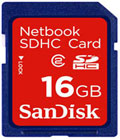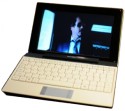Faster SSDs target Linux netbooks
Jun 3, 2009 — by Eric Brown — from the LinuxDevices Archive — 2 views SanDisk has begun shipping a “next-generation” line of SSDs (solid state disks) for netbooks and ultra-thin notebooks, says eWEEK. Designed in collaboration with Ubuntu sponsor Canonical, the pSSD P2 and S2 have begun shipping along with netbook-geared 8GB and 16GB and SD cards, says the story.
SanDisk has begun shipping a “next-generation” line of SSDs (solid state disks) for netbooks and ultra-thin notebooks, says eWEEK. Designed in collaboration with Ubuntu sponsor Canonical, the pSSD P2 and S2 have begun shipping along with netbook-geared 8GB and 16GB and SD cards, says the story.
(Click for larger view of new P2 and S2 pSSDs)
The pSSD P2 and S2 drives, which are each available in 8GB, 16GB, 32GB and 64GB configurations, build upon the flash-memory giant's first pSSD line launched a year ago. The SanDisk P2 and S2 SSDs feature its nCache technology, a nonvolatile write cache, says the story in our sister publication, eWEEK.
 SanDisk 16GB SDHC |
According to Sandisk, nCache enables the drives to support burst performance up to five times their steady-state vRPM (virtual revolutions per minute). The drives are also touted as offering 9,000 vRPM and a nonvolatile cache of up to 320MB. In addition, SanDisk is said to claim that the pSSD drives provide up to 50 times the random write performance of its first-generation SSDs.
SanDisk also announced two new SDHC (secure digital high capacity) cards (pictured above), specifically intended for netbooks, says the story. The 8GB and 16GB SDHC cards are said to retail for $40 and $80, respectively.
eWEEK goes on to quote Eric Bone, SanDisk's VP of retail product marketing, as saying that netbook vendors are under considerable pressure from mobile network operators (MNOs), which are increasingly selling netbooks, to reduce costs and extend battery life. He also noted that storage can account for as much as 25 percent of a netbook's cost. As a result, more netbook vendors are said to be looking to SSDs to cut costs.
“The MNOs of the U.S. tend to be dictators, telling hardware suppliers how they want things done,” Bone was said to have told eWEEK. “From a hardware perspective, every dollar counts.”
Tested on Ubuntu Netbook Remix
According to the SanDisk press release, the company collaborated on the new pSSDs with Canonical, sponsor of leading Linux distro Ubuntu, as well as its newly Moblin v2-based Ubuntu Netbook Remix for netbooks. Testing the drives on netbooks running the Remix distro, the companies were able to make modifications that resulted in “improved system responsiveness and longer battery life,” says SanDisk.
 Pegatron smartbook reference design prototype for Freescale i.MX515 (Click for details) |
The technology was also said to have been favorably tested on a prototype netbook (or rather “smartbook”) running on Freescale's ARM Cortex-A8-based i.MX515 SoC. This was presumably Pegatron's Ubuntu-compatible reference design, using Ubuntu Netbook Remix. The design is also said to support Android.
Stated Chris Kenyon, director, OEM services, Canonical, “Canonical is enabling original equipment manufacturers (OEM) and designers (ODMs) to offer consumers a fantastic user experience with Ubuntu Netbook Remix running on netbooks. Our tests have shown SanDisk second generation pSSD equipped with nCache performing significantly better than a 5400 RPM HDD.”
Stated Glen Burchers, marketing director, consumer segment, Freescale, “All-day battery life is critical in the netbook space, where OEMs carefully evaluate each component for optimal energy efficiency. Like Freescale's i.MX51 processor, SanDisk's pSSDs are designed with power management in mind, thus addressing critical market requirements.”
Availability
The pSSD P2 and S2 drives (pricing unavailable), as well as the 8GB and 16GB SDHC cards, are available now, The SDHC cards sell for $40 and $80, respectively, says SanDisk. More information on the pSSD line may be found here.
The eWEEK story on the new SanDisk drives should be available here.
This article was originally published on LinuxDevices.com and has been donated to the open source community by QuinStreet Inc. Please visit LinuxToday.com for up-to-date news and articles about Linux and open source.